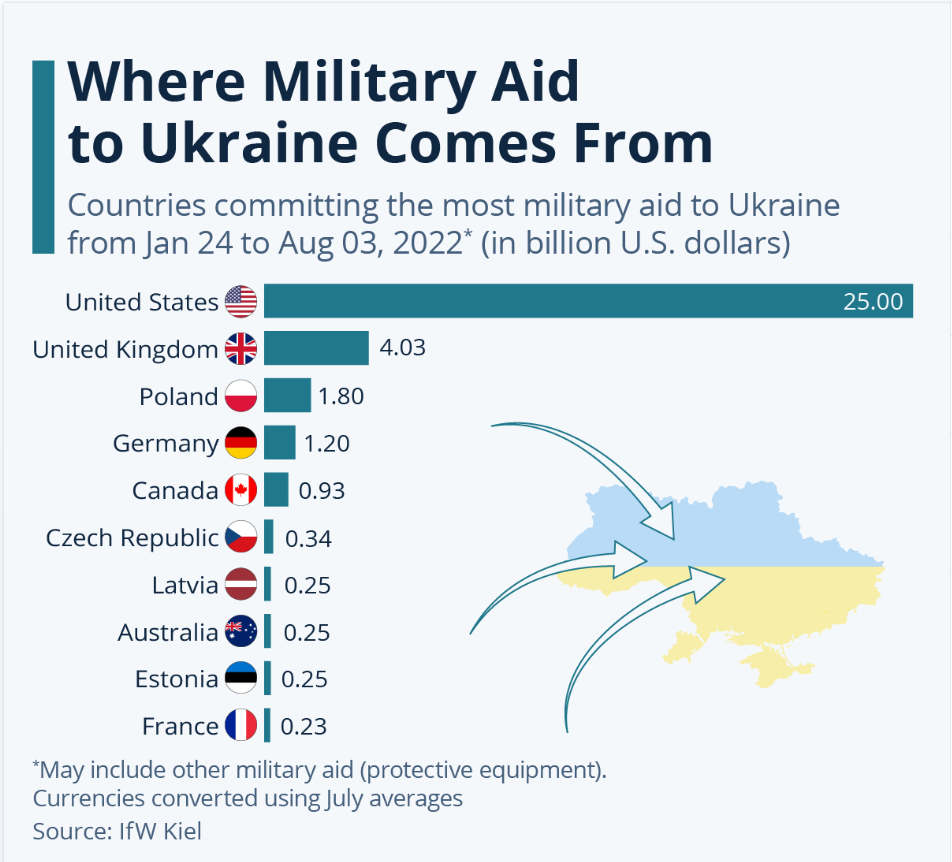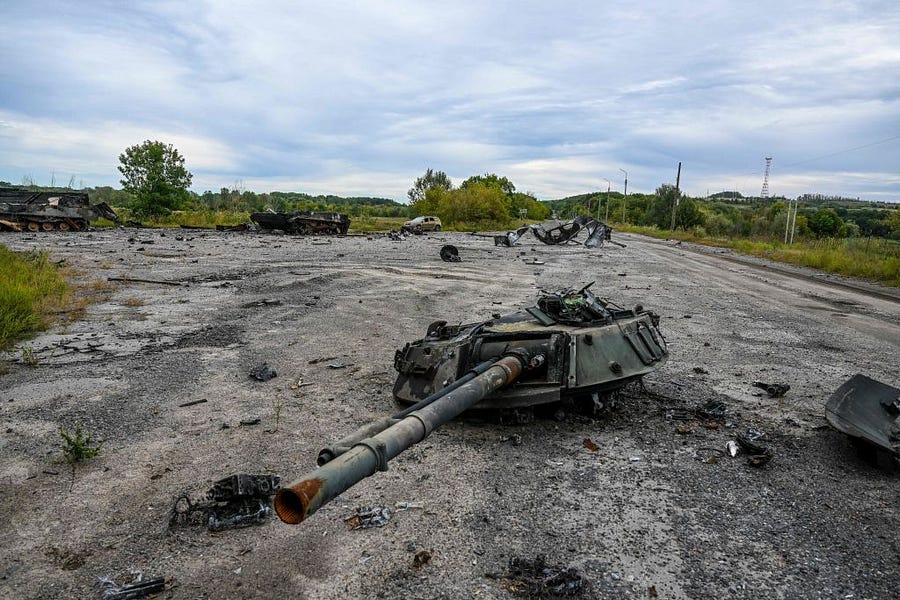The most important story in the world right now is what is happening in northeastern Ukraine. The Ukrainian army has achieved a breakthrough that few thought possible. Two weeks ago, I wrote a newsletter arguing that the tide was turning back in Ukraine’s favor. I was very cautiously optimistic. I argued that Russian troops appeared vulnerable, but that we shouldn’t expect a true Ukrainian breakthrough.
Rarely have I been so happy to be wrong. I knew Russian troops were vulnerable (though I was concentrating on Kherson and not Kharkiv Oblast in the north). I did not know how vulnerable they were. Few people did—until the Ukrainian offensive in Kharkiv shattered the Russian front in that region. Let’s put these gains in perspective.
First, here’s the map. Ukraine recaptured more land in a week than the Russians captured in months of grinding attacks in the east:
Second, this bit of detail from the U.K. Ministry of Defence—about damage done to the Russian army—is possibly even more important than Russia’s geographic loss:
To put it in plain English, Russian forces aren’t simply losing, many of their best units are facing catastrophic losses of men and material. And so far, Russia hasn’t fully mobilized either its manpower or its economy to fight this war. It is not producing advanced weapons at the rate necessary to replace battlefield losses, much less expand the force.
I want to be perfectly clear—the overwhelming credit for this astonishing turn of events goes to the Ukrainian military and the Ukrainian people. They’re the ones who have sacrificed beyond our comprehension. Their cities are in ruins. It is their blood on the battlefield. And I shudder to think what would have happened if Volodymyr Zelensky had fled Kyiv in the fateful, terrifying first hours of Russia’s assault.
At the same time, Americans should take a measure of pride in our bipartisan response. It should be grateful for the Biden administration’s resolve. Decades after two world wars, we’ve proven once again that our nation is the arsenal of democracy, and it’s hard to imagine Ukraine’s military resilience without the flood of primarily American aid. The UK has been magnificent as well, but look at this chart:

Ukraine had fewer munitions, less advanced equipment, and less capacity to replace losses than Russia. The west has poured so much aid into Ukraine that we’re depleting even our own stocks of advanced weapons (including Javelin and Stinger missiles).
As a fiscal conservative, I’m fully cognizant of the reality that America doesn’t possess unlimited resources. I would also be reluctant to pour weapons into a losing war, prolonging suffering only to delay the inevitable. But this is not a losing war, and the billions of dollars we’re spending to sustain the Ukrainian war effort may represent one of the more cost-effective allocations of American resources in recent history.
Yet on September 7, Heritage Action for America, the political arm of the Heritage Foundation, one of the right’s most powerful institutions, publicly opposed a new $11.7 billion aid package for Ukraine. It claimed the administration’s funding requests (which also included funding a federal monkeypox response and additional disaster relief) “ignore the concerns of the American people” and that U.S. support for Ukraine “deserves an open and honest debate without liberal congressional leadership using funding for the U.S. government as a vehicle for Washington’s priorities.” Yet Americans have had more than six months to “debate” Ukraine aid. This is not a new issue.
For context, Heritage issued this statement six months after its president opposed the initial $40 billion aid package to Ukraine:
And this is after Heritage Action declared that the initial aid package “puts America last.”
Heritage isn’t alone. Russ Vought at the Center for Renewing America argued that “This new package will prolong a fight that lacks an American dog, allowing regional allies to shirk their security responsibilities yet again.” Indeed, as a piece at Defense One notes, multiple new right figures continue to oppose additional aid to Ukraine, and the concentration of opposition to Ukraine aid on the right means that—for the first time in my entire life—Republicans are more reluctant to confront Russian aggression than Democrats.
Continuing to arm Ukraine to the teeth isn’t simply an act of American charity. It’s not even primarily a matter of morality. It’s a matter of cold, hard strategic and financial calculus.
Let’s put American assistance in perspective. In 2016 the United States defense budget was approximately $640 billion. By 2020 it was $778 billion. I don’t begrudge that spending. It was necessary. I fully supported the Trump defense budget increases.
But we have to ask why it was necessary to commit more than $100 billion in new annual spending to the military even as our wars in Iraq and Afghanistan were winding down. Our primary foreign adversaries—Russia and China—were modernizing their militaries. The quantity and quality gap between our respective forces appeared to be narrowing.
We don’t commit immense amounts of money to national defense as part of the world’s most expensive jobs program. We commit those dollars to deter war against formidable foes, and the more formidable our foes, the more resources we need to commit.
Moreover, war is far, far more expensive than deterrence. By 2020, the Iraq War alone was estimated to cost the United States $2 trillion, and that was a low-intensity conflict, especially by comparison to the conflict between Russia and Ukraine. The cost of true great-power conflict would dwarf the costs of the Iraq and Afghan wars combined.
By investing tens of billions of dollars in Ukraine today, we’re causing catastrophic losses to the Russian war machine. We’re helping the Ukrainians set back the Russian military by years. And by pouring weapons into Ukraine, we’re reassuring our European allies of our commitment to European security and helping maintain NATO as one of the most successful defensive military alliances in world history.
Now is not the time to declare victory and end assistance. It is entirely right and proper to be grateful for Ukraine’s significant battlefield victory, but history is littered with examples of victorious armies suffering profound military setbacks yet still prevailing in long wars. That’s part of the history of the Russian army. That’s part of the history of the American army.
I’ll leave you with thoughts from Gen. Mark Hertling. I served under him in Iraq, and I’ve benefited from his wisdom and experience:
I’d urge you to click through and read the entire thread. Russia is still a dangerous adversary. As I said earlier, it has not yet fully mobilized. The nation has immense latent power. Ukraine is still much smaller, and it has taken staggering losses.
Yet American aid is sustaining a valiant people in a righteous cause, it’s demonstrating the continued strength and vitality of the liberal west, and the sheer power and effectiveness of the deployed American weapons sends an additional message to potential foes.
America is the arsenal of democracy. That’s good news for a courageous people, and it’s good news for us. Our aid preserves Ukraine, deters our enemies, and—ultimately—helps sustain the liberal order that preserves our way of life.
One more thing …
Over at The Atlantic, I have a big piece about America’s two child porn crises—the crisis of childhood sexual abuse and the the crisis of sexual exploitation. Are we helpless to confront the problem? Here’s how I introduce the issue:
The terrible toll of child sexual abuse requires little explanation. Many girls and boys who have survived abuse carry the consequences for a lifetime, and because of the almost endless ability of porn consumers to find, download, and upload the same images, survivors can be traumatized again and again.
The consequences of childhood sexual exposure—while in no way comparable to the trauma of those exploited—are also becoming clear. Women and men are reporting that their relationships are twisted and distorted by early exposure to porn, and that’s contributing to an immense amount of pain, exploitation, and heartbreak.
Parents are indispensable in confronting this challenge, but we can’t rely on parents alone. In the piece I put forward a combination of corporate, cultural, and political proposals for combatting a dreadful scourge:
Pornography is a multibillion-dollar business that directly profits both from child abuse and from sales of sexual images to young children. Child sex abuse destroys lives. Childhood sexual exposure has warped the marriages and intimate relationships of an entire generation of Americans. It is not too much to ask American culture, American corporations, and American governments to respond. The Constitution does not require us to sacrifice childhood innocence on the altar of adult lust.
Please give the piece a read and offer your thoughts on solutions in the comments below.
One last thing …
I know Tucker Carlson is committed to casting doubt on the dominant narratives of the war in the Ukraine, but this is … something else. Amazing:







Please note that we at The Dispatch hold ourselves, our work, and our commenters to a higher standard than other places on the internet. We welcome comments that foster genuine debate or discussion—including comments critical of us or our work—but responses that include ad hominem attacks on fellow Dispatch members or are intended to stoke fear and anger may be moderated.
With your membership, you only have the ability to comment on The Morning Dispatch articles. Consider upgrading to join the conversation everywhere.